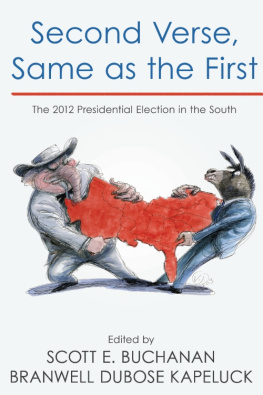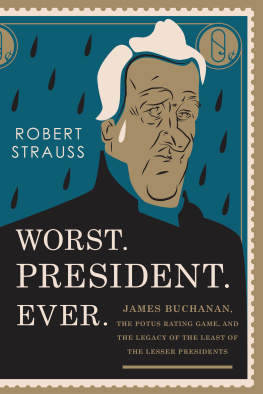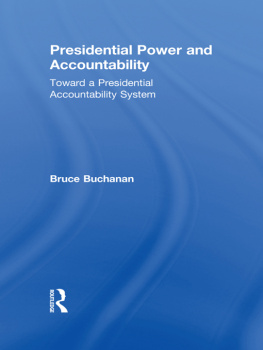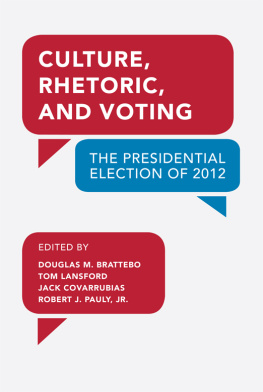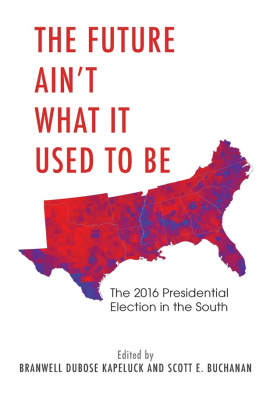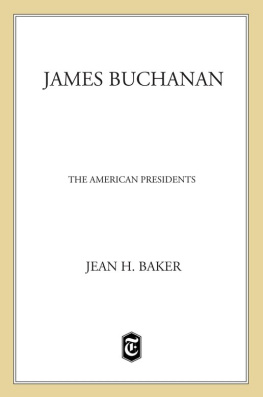Second Verse, Same as the First
The 2012 Presidential Election in the South
Edited by Scott E. Buchanan and Branwell DuBose Kapeluck
The Citadel Symposium on Southern Politics
The Diane D. Blair Center of Southern Politics and Society
The University of Arkansas Press
Fayetteville
2014
Southern Politics and the 2012 Presidential Election
The contemporary American South continues to be one of the most rapidly changing regions of the country. Dramatic changes in population, economics, and partisanship have altered the political landscape of not only the region but the entire nation. Prior to the civil rights movement, the Solid South stood as a monument to de jure segregation, the politics of race, and the power of the Democratic Party over local, state, and national elections. Following the civil rights movement, the Souths transformation from a once solidly Democratic stronghold to a consistently Republican region was one of the most dramatic political changes in American political history. The wide-ranging effects of this development on electoral behavior and public policy are difficult to assess, but it is unquestionable that the New South remains as important to American politics as the old. With 153 Electoral College votes, a Solid South represents over half the necessary 270 electoral votes necessary to win the presidency. Over twenty years ago, in The Vital South: How Presidents Are Elected, Earl Black and Merle Black paraphrased W. E. B. DuBois by arguing that as the united South goes: so goes the nation (344). Given the historical forces that have moved the South to act as a unified voting bloc, it is no coincidence that many of our recent presidents have hailed from one of the former Confederate states. The surprising success in 2008 of the first African American presidential candidate and the Democratic Party across several southern states suggests that Republican dominance of the region may be in decline. Not only did several southern states support a northern liberal Democratic candidate, but they supported the nations first African American presidential nominee. In a region better known for Jim Crow segregation than racial tolerance, such outcomes beg for scholarly investigation.
Despite the signs of possible two-party competition in the South, the 2012 presidential election reminded us of the solid control that the Republican Party maintains across the region. Republican presidential candidate Mitt Romney won nine of the eleven former Confederate states. Further, at the state and the local levels, the Republican Party continued to increase its standing. Despite the millions of dollars spent on campaigns across the country by the Democratic Party and changes in states like Florida and Virginia, the Solid South remains securely in Republican control. In many ways, the voting patterns in 2008 were repeated or even exaggerated in 2012. In the 2012 presidential election, white voters supported the Republican candidate in greater percentages than they did in 2008. We find similar patterns among urban voters versus suburban and rural voters, as well as older voters versus younger voters. The changing demographics of the South continue to be the only indication that two-party competition will ever again return to the South.
The Presidential Elections in the South Series
Since the 1984 presidential election between then-president Ronald Reagan and former vice president Walter Mondale, our colleagues at The Citadel have drawn attention to the importance of the South in presidential elections. Every four years, these scholars have facilitated important insights into presidential elections, and this book series has not only advanced our systematic understanding of southern politics but also served as a catalyst for countless articles and books focusing on the politics of the region. Through this 2012 edition of the series, aptly titled Second Verse, Same as the First, we can more clearly understand how President Obama and the Democratic Party won the presidency while winning only two southern states. Furthermore, we can learn a great deal about the successful Republican Party strategy of leveraging frustration with (and even animosity toward) President Obama and with politics in Washington that created substantial gains in Republican Party strength in state houses and in senates across the South. Some of the gains were, of course, because the Democratic Party largely ignored many southern states and focused the presidential campaign in battlegrounds outside the South.
Fittingly enough, Diane D. Blair was an important contributor to this series in the past. Consequently, the Blair Center of Southern Politics and Societys collaboration with The Citadel and sponsorship of this important book series is not only appropriate but also an exciting opportunity.
The Diane D. Blair Center of Southern Politics and Society
The Blair Center was established by a congressionally appropriated endowment granted in the fall of 2001. The center is a part of only a handful of research centers across the nation established by congressional appropriation and one of the only centers established to honor an individual who was not a former member of Congress. The Blair Center is dedicated to supporting interdisciplinary scholarship, study, and outreach relevant to southern politics.
Diane Divers Blair was born on October 25, 1938, and was raised in Washington, DC. She received her bachelors degree from Cornell University in 1959 and worked in Washington, DC, for the Presidents Committee on Government Contracts, in a Senate committee on unemployment, and as legislative secretary and speechwriter for Sen. Stuart Symington of Missouri. She moved to Arkansas in 1963 and received her masters degree in political science from the University of Arkansas in 1967. She debated Phyllis Schlafly before the Arkansas legislature on Valentines Day 1975 on behalf of the Equal Rights Amendment, and in 1992 she was selected to cast one of Arkansass ballots in the Electoral College.
Diane Blair taught at the University of Arkansas for thirty years and established a record of accomplishment unparalleled in its combination of serious scholarship and practical involvement in both local and national politics. In May 2000, Blair was awarded an honorary doctor of laws by the University of Arkansas, and she was twice nominated to the board of the Corporation for Public Broadcasting by President William Jefferson Clinton and twice confirmed to that position by the Senate. She served two terms as chair of the Corporation for Public Broadcasting, and the corporation has now named its governing board after her. She was appointed by Governor Dale Bumpers in 1971 to serve as chair of the Governors Commission on the Status of Women, by Governor David Pryor in 1976 to chair the Commission on Public Employee Rights, and by Governor Bill Clinton in 1979 to serve as a member of the Arkansas Educational Television Network commission, on which she served until 1993 and which she chaired from 1986 to 1987. In 1992 she took leave from the University of Arkansas to serve as senior researcher for the Clinton presidential campaign and again took leave in 1996 when she served as senior advisor to the Clinton-Gore reelection campaign.

